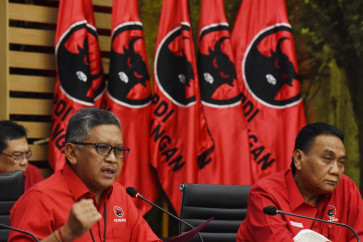RI hospitals must be ready for BPJS
Regardless of their current condition, both state- and privately-run hospitals in the country must be ready to implement the national healthcare system under the Social Security Providers (BPJS) Law in January next year
Change Size

R
egardless of their current condition, both state- and privately-run hospitals in the country must be ready to implement the national healthcare system under the Social Security Providers (BPJS) Law in January next year.
Akmal Taher, the Health Ministry’s director general for health development said that despite all the challenges, which included high occupancy rates and poor quality of human resources, hospitals and community health centers (Puskesmas) should make the effort to be ready for the universal health program.
Akmal said that one of the biggest problems for the implementation of the universal healthcare program was that the occupancy of the third class beds in hospitals was above the standard occupancy rate of between 60 to 80 percent.
“Many people prefer going to hospitals rather than a Puskesmas. The mindset of the public should change but at the same time we have to work to improve the human resources quality at local community health centers so that patients have no hesitation to get their medication there,” Akmal said on Monday.
Hasbullah Thabrany, a professor of public health from the University of Indonesia (UI)’s School of Public Health, said that the potential problem in the implementation of the program is the small amount of the premium paid by the government for low-income individuals.
The Finance Ministry has said that the government could only afford to pay Rp 15,500 (US$1.59) for every low-income person eligible for the program.
Experts have said that the amount would not be enough to cover all types of health problems, which could include serious illnesses like cancer, diabetes and thalassemia.
“With that amount of premium, the government could not force private hospitals to join the healthcare program, because they don’t pay their health workers with the state budget. It would be hard for them to sustain their operation if they are forced to join the healthcare program,” Hasbullah said on Monday.
He said that the government should just focus on state-run hospitals and community health centers to provide universal healthcare.
“The only solution is to leave the service of the universal health coverage to the puskesmas and state-run hospitals, which will lead to an increasing number of patients at these facilities,” he added.
Dodi Firmanda, the head of the medical committee at the Fatmawati Hospital, said that the hospital is ready to implement the universal healthcare program.
“It’s our job to serve the patients and even though the occupancy rate in the third class is high, we could use the second class and even the VIP class, while in the meantime we can prepare more spaces and beds for the increasing number of patients,” Dodi told The Jakarta Post.
Separately, Amal C. Sjaaf of the University of Indonesia’s School of Medicine said that the hospitals, both state- and privately-run hospitals, should not have concerns over how much the government would pay for premiums of low income families. (nad)









